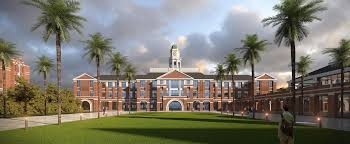Charterhouse charges N26m yearly, not N42m, says Director
The Founding Head and Director of Education at Charterhouse Lagos in Lekki-Ajah, Mr John Todd, has clarified the misinformation circulating online regarding the school’s fees.
In an interview with our correspondent, Todd explained that the school’s actual fees was N26m per year, not the N42m that had been widely alleged online.
There was significant public outrage in April this year over claims that Charterhouse, a newly established school in Lekki, Lagos, was charging N42 million per annum.
Charterhouse, a prestigious British independent educational institution, is set to open its first African campus in Ogombo, Lekki, Lagos, in September.
According to its website, the Charterhouse Family of Schools has been a leading name in British education for over 400 years.
The Lagos campus, which will welcome its first set of students from Year 1 to Year 6 in September 2024, occupies 70 hectares of land and is the first African version of Charterhouse UK in Nigeria.
Todd addressed the issue directly stating that “In April, there was an online reaction to our school fees, which sparked a lot of discussion, with some people reacting to the figure of N42m. I want to set the record straight: our fees are currently N26m, not N42m. We’ve never charged N42m. There were headlines claiming we were the most expensive school in the world, but we’re not even close. Charterhouse in the UK currently charges around £50,000, so we’re not on that scale. Many American schools have fees higher than ours.”
He added that many Nigerians who sent their children overseas for education could now have the same experience in Nigeria while keeping their children within their cultural environment.
“When we consider why people leave, it often comes down to issues like healthcare, schools, and job opportunities. We’ve looked at this and realised that if people can afford to send their children to school overseas, it would be cheaper for them to attend school here. Plus, the children remain within their culture.
“If you calculate the cost of flights for a child studying in the UK, it adds up to around N5m for a round-trip business class flight. To go every month is about N50m a year. Even if our fees were N42m, it would still be cheaper than sending a child overseas. Additionally, if the child stays here, they maintain a connection to Nigeria. If a child studies overseas for 13 years, the UK becomes their home, not Nigeria.
“We hope that by offering high-quality education here, we can encourage families to stay in Nigeria. Over the next 15 to 20 years, we want to see these students grow into young adults who choose to live, work, and invest in Nigeria rather than move abroad.”
Todd also highlighted two key factors that made the school unique; “the quality of learning, which leads to the quality of education, and this is largely dependent on the caliber of teachers, and the state-of-the-art facilities.”(Punch)


